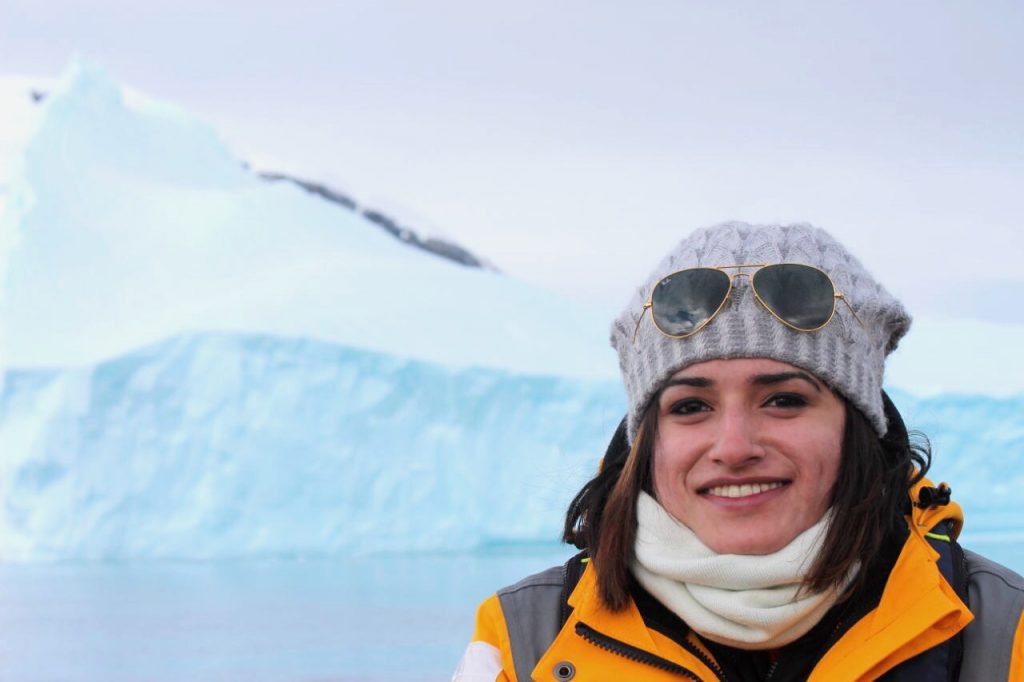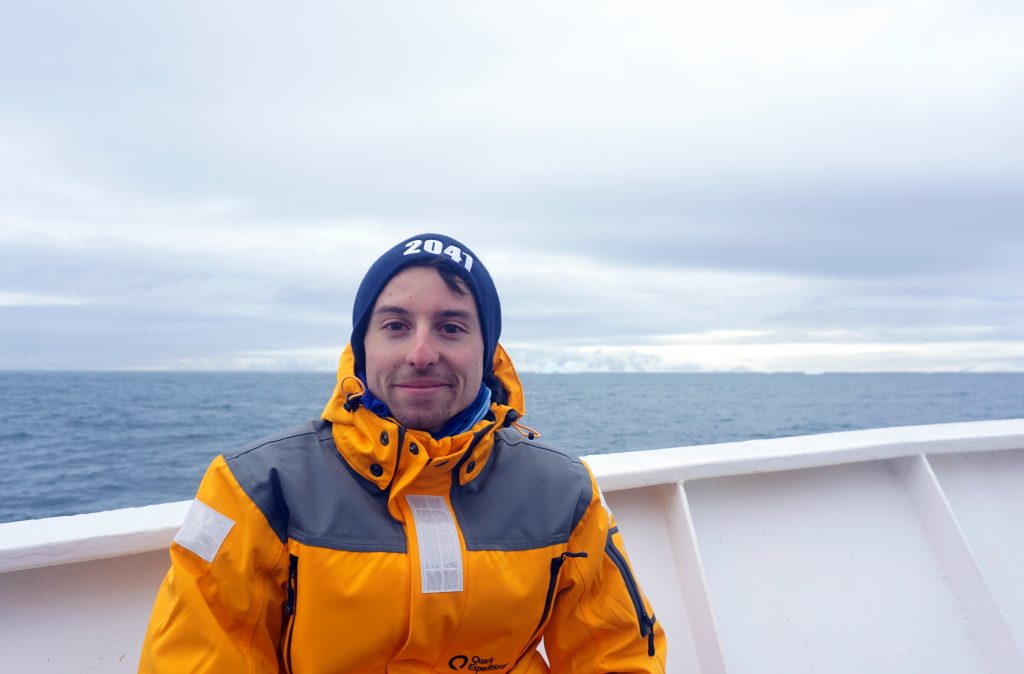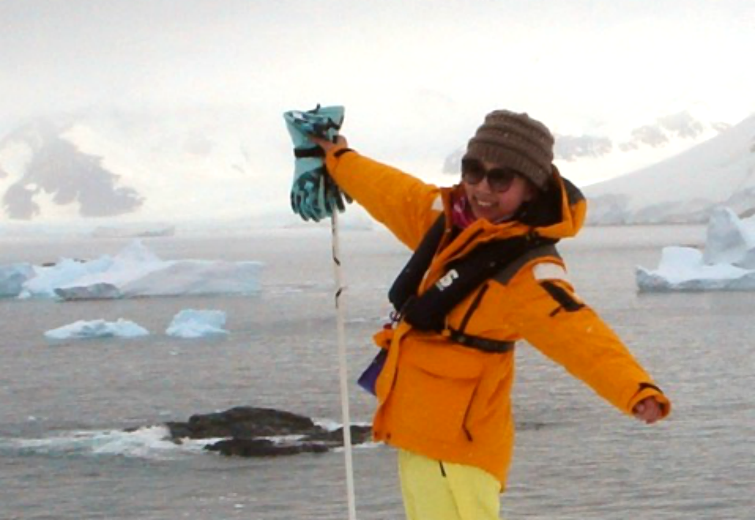It is frequently said that the future of the planet rests on the shoulders of today’s youth. They are the changemakers, the ones who will need to see innovative solutions to the Earth’s environmental problems through to their completion. That’s a tall order, but some 20-somethings are up for the challenge.
Three months and half a world away from their journey to Antarctica on board the ClimateForce Expedition with The Explorer’s Passage and 2041, led by Sir Robert Swan and his son Barney Swan, three youth continue to share their experiences about climate change set against their journey to this stark and distinctive environment. The Adventure Travel Trade Association (ATTA) got in touch with them to find out what they learned on this voyage to the end of the earth and how they’re continuing to make positive changes in their everyday lives.
Originally from Shimla, Himachal Pradesh, in India, Shivangini Singh, 23, is an applications developer for Oracle Financial Services Software in Bangalore. Stan Muraczewski, 26, is a student in sustainability, currently working toward his master’s of science degree in Paris, France. And Manyi Wang, 24, is from Jiangxi Province in China, currently pursuing a master’s degree in public policy at the University of Chicago in the United States.
ATTA: What was your motivation for participating in the ClimateForce trip?
Singh: I am from the northern part of India. It sits in the hills and is a beautiful place where it snows during the winter. A year ago I participated in a month-long mountaineering course, and we got the chance to ski in the Beas Kund Glacier. While we were undergoing training on the glacier, we were told by an instructor that, a few years ago, during the same training, the instructors only had to reach the foothill of a certain mountain to begin the training. As the years have gone by, during that same month in the year, the training has had to move further north to reach that patch of snow. That’s one practical application where I saw climate change.
Also, the area where I come from is a small town, and with each passing year, the rainfall pattern has totally changed. It never used to get warmer than 25 degrees Celsius at any point in the year, but the temperature has started increasing, and the snowfall has been reduced. My home was my biggest motivation. All the adventures in the world amount to nothing if I come back home and find it in a condition I don’t recognize. Climate change is something we can see, so when I came across Rob’s expedition and its mission, I couldn’t help but apply.
Muraczewski: It all started about a year ago. I was back in France after a two-year contract working in Bangladesh for an international sports retailer — back with the experience and views about environmental destruction and climate change impacts. It grew my conviction that I had the responsibility to change and get myself involved to help spread the word. A friend from India told me about Mission 2041 — the same expedition he went on in 2013. I had a look at the organization, and for me it was clear: This was the type of engagement I wanted to take on.
My three main drivers were the fact that it was an international mission, people came from all sectors, and it was about a very unknown place on Earth with critical geopolitical and climate change stakes.
Wang: Climate change is happening. It is a serious problem and is affecting all the species around the world. Promoting an energy transition to a prosperous low-carbon energy future is one of the solutions I strongly believe in. Thanks to emerging technologies and aroused public awareness, renewables are ready for the market, while more work is expected to bring costs down.
As a nature lover, I have experienced the Arctic Circle, mountains, deserts, forests, and lakes. I am so eager to help protect this amazing planet and make it possible for more generations to appreciate the pure beauty of it. Throughout the trip, I wanted to meet people across different sectors, professions, countries, and races to collaborate together for one common mission: sustaining all forms of life on this planet. I was curious about actions taken by others.
Moreover, I was so fascinated by the beauty of the far South and really wanted to witness the miracles of life and experience the chilly wind there for myself.

ATTA: What specifically did you learn on the expedition that has stuck with you?
Singh: Usually, people ask, “How can I change things?” The first step toward doing anything is changing your own mindset, and one thing I learned is that you matter, no matter how small your actions. They matter. There is a ripple effect. Right now I’m starting this conversation, and tomorrow I might be able to influence a hundred people. We need to start the change right now. Each and every person.
Muraczewski: They are two learnings that really struck me. The first one is about the carbon budget we have left before the 2 degrees Celsius temperature increase, the target signed by 190 countries during the Paris climate agreement. Simply put, we have already emitted two-thirds of what we can emit to stay below the 2 degrees, and there is only one-third left. This is a scenario from the International Panel for Climate Change that gives us just 20 years before reaching that tipping point. Knowing this, I understand so much better the urgency to act, all together.
The second one concerns the geopolitical stakes around Antarctica. Despite the Antarctic treaty mentioning clearly that no countries can declare ownership on the Antarctic, I learned some countries still have sovereign claims on some parts. This is why Mission 2041 is here, to follow up on that and make sure in the near or long-term future, no countries will ever take over this place or its resources.
Wang: Fighting against climate change is also about solving global conflicts. It should be considered and solved under the big context of other social issues. More mutual understanding, compassion, and collaborations are expected from different countries, industries, and people.

ATTA: Now that you're home, how are you acting on the things you learned?
Singh: The first step is to increase awareness so the conversation gets started. To do that, I recently gave a talk to my team members about my expedition, Antarctica, what global warming is, and how they can start making changes at their own individual level. I was surprised how interested people were. The next step is giving the talk to a larger audience. Step by step, I want to take this talk to all the teams in my company.
I’ve contacted a few schools to give talks. I will be on a radio show in Bangalore to talk to listeners about my expedition and hopefully motivate them. I intend to go back to my hometown and start an initiative on planting trees. And I’ve been sending out articles to the local newspapers about my journey. I’m continuing to get the word out there.
Muraczewski: One of my engagement goals is to spread the word and engage people to act individually at first and move toward collective actions. So far, I’ve spoken to and exchanged with more than 200 people, from 12 years old to 70 years old. I am also acting individually by re-educating myself. For example, I am switching, slowly but surely, to a vegetarian diet and using the less-emitting transportation system. Today I am still looking for a way to engage collectively with my communities, create an association in France around these topics, or join one that already exists.
Wang: Together with several peers, I initiated a sustainability program at school to help people recycle and reduce coffee cup use at several cafes across my university’s campus. Also, I’m working on building a platform to help people in China check out the nearest national parks so they can get closer to nature.

ATTA: What message would you like to share with other young people about climate change, the planet, and/or Antarctica?
Singh: The biggest thing I learned from this expedition was from Antarctica itself. Just being there on that continent that was so pristine, so beautiful, totally untouched by civilization, has taught me, to the best of my ability, to live so I won’t leave any footprint on nature itself. Oftentimes, since we live in such busy cities and the hustle and bustle, we forget our true nature.
Muraczewski: It can feel quite overwhelming as a young person to learn about climate change, the wideness of the topic, the worldwide dimension of it, and the fact it can't be solved by one individual or a small group of people. In spite of that, I strongly believe we all have and will have a role to play in this fight, and this is where it gets exciting. We can all do something, from a small gesture to getting engaged personally and professionally to make sure we leave a better place behind than what we found. We will need every one of us, so let's get together and act!
Wang: We have every obligation to protect this living planet. As young people, we need to read more, listen more, understand more, and share more.
This article is part of an Adventure Travel Trade Association (ATTA) initiative addressing important topics identified as critical to the protection and continued advancement of the adventure travel industry. Each initiative — eliminating plastics, women in leadership, climate action, and young leaders — has a dedicated team focused on building awareness of, advancing educational opportunities in, and creating a lasting impact on each of these areas within the adventure travel industry. We invite you to visit the ATTA’s initiatives page where you can access reports, read the latest news, participate in active projects, and join conversations within the membership community.
